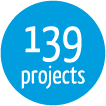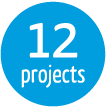The year 2020 turned out to be the one to remember. We had to face the challenges of a new world we stepped into. There was a struggle but it was followed by development and creation. Currently, we are opening a new chapter with advanced stage of preparations for the NEXT Programme edition. 2021 will be foremost important for all CBC programmes on EU external borders, because along with the 2021-2027 financial perspective we will join the Interreg Family.
The beginning of the year is a good time to prepare some sum up, and we would like to briefly summarize the main activities and achievements of the Programme in 2020.
![]()
Just to remind, the Programme supports 4 thematic objectives – Heritage, Accessibility, Security and Borders through financing of 3 “types” of projects: Large Infrastructure Projects (LIPs), regular projects and micro-projects:
LIPs – TO Accessibility, Security, Borders
Regular projects – TO Heritage, Accessibility, Security and Borders
Micro-projects – TO Heritage

By the end of 2020, 139 projects were implemented, of which:
- 10 were LIPs;
- 64 were regular projects;
- 65 were micro-projects.

12 projects were completed:
- 1 LIP;
- 8 regular projects;
- 3 micro-projects.

Within these ‘first’ completed projects, we have:

In total, 85 km of roads in the Programme area were built or reconstructed within these projects. First of all, local roads connecting towns and villages that suffer the most from poor infrastructure availability, but also poviat roads and, within the LIP, section of the Lubelskie Voivodeship road No.812 connecting Korolówka with Włodawa, were modernized. Road repairs were conducted in the Lubelskie, Mazowieckie and Podkarpackie Voivodeships (PL), in the Hrodna and Brest Oblasts (BY) and finally in the Lviv and Volyn Oblast (UA).

Projects ROAD and Pavilions were led by Podlaski Voivode. They supported border efficiency and security. The main output was two additional control lanes and new pavilions for custom and passport control at the Kuźnica Białostocka-Bruzhi border crossing. These activities were among other parallel tasks improving the border efficiency. By finalization of these two projects, the throughput border capacity increased almost by 76%, significantly accelerating border control.

They primarily carried out soft activities promoting local culture and history. The focus of micro-projects is always on what is "close to the heart" of local communities. Some of the many outputs and results achieved by these micro-projects are:
- 2 virtual walks;
- 1 mobile application;
- outdoor cultural events (conferences, concerts);
- workshops and exchange for cultural management;
- numerous albums, travel guides and maps developed and published in print and online.

- 178 application forms were submitted within the 3rd Call for Proposals and then assessed by the JTS;
- 28 micro-projects from this Call are being contracted now.
![]()
- 10 trainings on project implementation and closure for the beneficiaries of all Calls;
- training on ‘below threshold’ procurements for Polish beneficiaries of the 2nd Call for Proposals;
- individual consultations on contracting issues for beneficiaries of the 3rd Call for Proposals;
- 47 interim reports of regular projects and LIPs approved;
- 2 final reports of regular projects submitted and approved;
- we prepared on-line materials, guidelines, FAQ section and organized consultations for all beneficiaries;
- we assisted beneficiaries in implementation and communication of their activities;
- we assisted beneficiaries in minimizing the COVID-19 influence on implementation of the projects.
![]()
- additional 3 MEUR was allocated from the Programme to 12 healthcare projects to allow them purchase special equipment and supplies to better fight with pandemic;
- we modified the Programme documents to facilitate the implementation of the projects under the pandemic.
![]()
In these challenging times, in order to maintain relations with stakeholders, beneficiaries and to attract new audiences, we used new instruments to achieve our communication goals:
- online transmitted the Programme Annual Event ‘PBU on the air’;
- 6 thematic movies presenting the scope of the Programme;
- special movie on the PBU support for the fight with pandemic (medical projects);
- 7 competitions targeted at a various audience which gathered a total of 400 participants;
- cycle ‘PBU on the radio’ – conversations of BOs and projects representatives;
- as part of ECDay and Interreg 30 years anniversary celebration we organized competition for youths, as well as Traveling through projects” competition, and a special event ‘Give a tree to the Carpathians’ in Skole;
- we participated in various events held traditionally (such as 13th Europe-Ukraine Forum, European Congress of Local Governments, East of Culture Festival) and on-line (like European Funds Open Days);
- we focused on communication through the Programme website with:
- 9 project stories;
- 13 projects of the week presentations;
- 14 other news related to the projects’ activities;
- 133 news published;
- 156 Facebook posts.
- we introduced new functionalities and tabs on the Programme website:
- ‘Projects’ tab;
- ‘2021-2027’ tab;
- PDF document viewer.
- we prepared the ‘Regular projects’ publication and 2020 issue of ‘The Crossborderer’ in a refreshed form.
![]()
Preparation of the Interreg NEXT 2021-2027 Programme:
- we organized a public survey on new Programme objectives
- the socio-economic analysis of the Programme area and the strategy part of the Programme document were prepared;
- we organized public consultations of the Programme document in all three countries;
- 16 LIPs project summaries were submitted and assessed;
- we started work on the Strategic Environmental Assessment of the new Programme.
The great challenge was to adapt to the new circumstances. The way in which the Programme, its beneficiaries and projects cope to sail through these difficulties is very rewarding and we are proud of the work done. Now we are looking forward to the new to come.
„The best way to predict the future is to create it”
- was once said. These words spoken in the mid-twentieth century are still relevant today.
Was this page useful?


